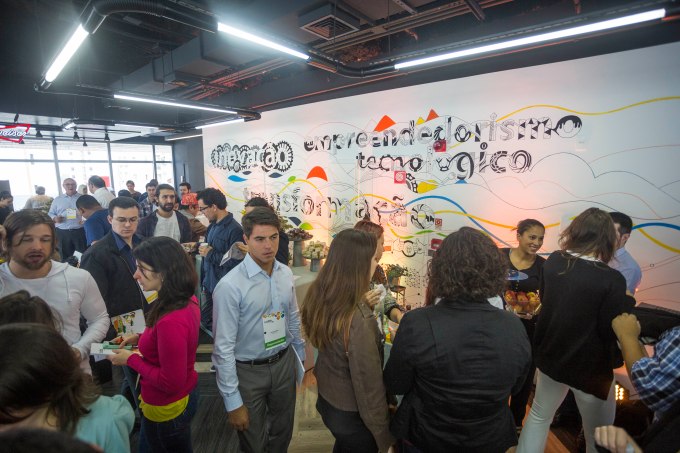Despite a miserable macro-economic mix of circumstances, including the worst recession in almost 100 years, the biggest corruption scandal Brazil has ever seen, and calls for President Dilma Rousseff’s impeachment, Brazil’s tech industry is thriving.
Startups are churning out funding announcements as fast as the bad news pours in, with over $150M in announcements this summer alone.
Venture capitalist Anderson Thees, a founding partner of Redpoint eventures in São Paulo, says the ecommerce and web sectors have grown over 20% year-over-year, while Brazil’s GDP has stayed flat, and tech is all but guaranteed to keep growing.
Although only half of Brazil’s population is online, it’s already the fifth largest internet and mobile economy in the world, a top five market for Facebook, Google and Twitter, and one of the fastest-growing smartphone markets globally — with another 100 million people starting to come online.
Last week, while Brazil reeled from Standard & Poor’s surprise decision to junk the country’s debt rating, the country’s top venture capital investors and entrepreneurs gathered in São Paulo to celebrate the launch of Cubo, a 50,000 square foot tech hub for startup entrepreneurs.
The not-for-profit venture between Redpoint eventures and banking giant Itau is the most ambitious co-working space I have seen aside from New York City’s Civic Hall, and provides office space for 250 entrepreneurs and fifty startups, across five floors of prime commercial real estate in São Paulo’s ritzy Vila Olimpia district — plus an auditorium for events, and a rooftop open to the public to encourage use of the space as hub for the tech community.

Redpoint eventures Cubo launch party
There are no exact numbers on the venture capital investment in Brazil this year over last year, in part because Brazilian entrepreneurs (and their investors) are notoriously reticent to disclose investment rounds or dollar amounts. But venture capital investment in Latin America has grown over over 800% since 2010, totalling over $650M.
In Brazil, startups have been announcing at least one funding deal a week in recent months, as local and international venture capitalists have teamed up to invest at least $150M across mobile, ecommerce, education, banking, shipping, services and security sectors this summer.
“What is a little odd, and very beneficial, is the way that the digital economy is faring through this crisis,” says Thees.
Redpoint eventures has announced six deals in recent months: seed investments in Olist, Escale and Intoo, a $3M Series A investment with Accion’s Frontier Investments Group and QED Investors in BankFacil, and Series B rounds for digital marketing platform Resultados Digitais and data analytics firm Cortex Intelligence.
“If crisis remains for way too long, it could affect us, but for right now what we have is a detachment between what we have in the startup ecosystem and the macro-economy. Anderson Thees, founding partner Redpoint eventures
Thees says the total number of deals the firm is about the same as last year, but that the opportunities are better now that some of the Brazil buzz has died down. “Those guys that were jumping ship from a big company expecting to make a fortune in six months — that’s gone.”
“If crisis remains for way too long, it could affect us,” Thees says, “but for right now what we have is a detachment between what we have in the startup ecosystem and the macro-economy. It would be better if we didn’t have it, but we might actually end up moving faster with it. Because when everything is great, people tend not to change behavior. People are more likely to pay attention to efficiency now, and they might be more willing to experiment with new things.”
BankFacil, an online lending platform that helps Brazilians identify and secure lower-interest financing, is one of the startups that is primed to benefit from the downturn by helping Brazilians save up to 70% on loan payments. BankFacil founder and CEO Sergio Furio says Brazilians pay ten to twenty times more interest on debt than American consumers: 120% on consumer loans (versus 11%), 300% for credit cards (versus 14%), and 58% for mortgages (versus 6-7%) — and household debt represents about 25% of the Brazil’s entire GDP.
“We’re using technology to create efficiencies in processes that are extremely inefficient,” Furio says.

Buenos Aires investment powerhouse KaszeK Ventures is also investing in economic efficiencies, announcing a Series A round in Contabilizei, an accounting services platform for small businesses and freelancers to navigate one of the most bureaucratic tax codes on the planet. Contabilizei that has grown over 350% over last year.
“I believe the most innovative feature at this point is offering a high quality service for a fraction of the current cost today,” says founder and CEO Vitor Torres. “By combining fanatic accountants with intelligent software, we are offering a high quality and cost effective service that substitutes entirely the traditional accountant. We are the last important piece that the SMB market needed in order to fully manage their businesses online.”
Contabilizei is one of over a dozen first-round investments KaszeK Ventures has made so far this year in Brazil. Other recent investment rounds include the fashion ecommerce startup Dress & Go; employer review site LoveMondays; NuvemShop, the largest provider of ecommerce store solutions for small businesses in Latin America; and pioneering peer-to-peer pet-boarding marketplace, DogHero (Brazil is the second largest pet market in the world behind the US).
“Looking beyond the ‘crisis’, the adoption of smartphones keeps growing, ‘consumer internet’ keeps going, and companies are incorporating more technology to lower costs, seek cost efficiencies or provide a better service,” says KaszeK partner Hernan Kazah.
“The companies with good projects and teams can take advantage of the moment and consolidate. In general terms, fewer competitors are going to secure funding. Less companies are investing in marketing, so acquisition costs are lower. There’s less difficulty to secure good talent. Costs in dollars are lower, so companies have a lower “burn” in dollars. And there are less distractions, so we can focus on the strategic points.”

KaszeK has also joined Tiger Global and Monashees for a $13M Series B in horizontal services marketplace GetNinjas. GetNinjas generates about $3.2M a month in contract jobs for over 100,000 registered service providers, from painters to wedding planners.
“It’s a big round for Brazilian standards,“ says GetNinjas CEO Eduardo L’Hotellier. “Some investors, especially the foreign ones, showed fear in relation to Brazil. But crises come and go, and our business has what we need to weather the turbulence and keep growing. We’re growing double digits month over month, so the economic contraction has had little effect on us.”
GetNinjas is one of a number of startups closing bigger rounds this summer. Security startup PSafe, the most downloaded app in Brazil, closed a $30M Series C investment with Redpoint eventures, Pinnacle and Quihoo360, making PSafe the first mobile startup in Latin America to reach a R$1B valuation (about $320M).
Latin American mobile commerce powerhouse Movile and Just Eat, the global online take-out service, made a $50M investment in Brazil’s leading food delivery service, iFood. And an undisclosed private equity firm in New York pumped $30M into BelezaNaWeb, the leading beauty ecommerce startup in Brazil’s $43BN beauty industry.
The company has been growing 50-60% year over year since closing a $10M Series B round with KaszeK Ventures and Tiger Capital in 2013, and is on a run rate to close R$100M (US $32M) in sales this year.
The education sector has also seen some big investments — all from foreign funds. Valor Capital, Amadeus Capital and Social Capital Partners teamed up for an $8M Series B investment in Descomplica, a radically accessible online education platform with 12 million active students paying less than $5 a month to access test prep materials for Brazil’s college entrance exams.
And an undisclosed American firm has made a R$23M ($7 million) Series B investment in Passei Direto, an academic social network with four million students, 50% of the Brazilian college market share, and zero acquisition costs to date.
“If crisis remains for way too long, it could affect us, but for right now what we have is a detachment between what we have in the startup ecosystem and the macro-economy. Anderson Thees, Redpoint eventures
Valor Capital also teamed up with São Paulo firm Monashees on a a $1.5M Series A investment in on-demand shipping platform Mandaê. “In our case and at this stage, the economic downturn wasn’t a factor,” says Mandaê CEO Marcelo Fujimoto. “Mandaê operates in a very large market and we also solve a very real, very big pain point shared by millions of people. As a result, we were showing very rapid growth — 30% month over month. For our Series A round, we got a lot of investor interest (both national and international) and were in a position to be selective.”
“There are amazing, big things happening behind the scenes in Brazil,” says Fujimoto. “While foreign perception of the potential here was perhaps too optimistic in 2010, it’s now swung way too far to the negative, which isn’t accurate either.”
